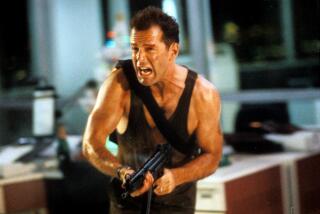AN APPRECIATION : Joseph Cotten: The Film Actor and the Gentleman
- Share via
Joseph Cotten, who died Sunday at age 88 of pneumonia (although after nearly two decades of failing health endured and fought with great courage), brought off two of the most difficult feats in Hollywood.
The most difficult art of all, of course, is simply to survive in the top ranks of the profession, and he did that handily, even though in his later performing years he sometimes had to play (and lend dignity to) material that was well below his stature.
The other achievement, hardly less testing, is to be able to balance star personality and status with the demand on actors to disappear into their roles. Cotten was an indubitable star personality; we went to see him because he was Joseph Cotten. Yet, in the way of very good actors always, he submerged himself so thoroughly into the characters he was playing that he was convincing in a wide variety of roles, from very good guy to very bad guy. (His range in itself was an achievement not all actors can bring off, or want to.)
When the Los Angeles County Museum of Art honored Cotten with a retrospective in 1987, the 16 films shown vividly confirmed that range, from the charming and lethal visiting uncle in “Shadow of a Doubt” to the steadying father seeing his family through World War II in “Since You Went Away” to the Westerner contesting with Gregory Peck for the favors of Jennifer Jones in “Duel in the Sun,” not to mention his memorable and varied visitations for and with Orson Welles in “Citizen Kane,” “The Magnificent Ambersons” and “The Third Man.”
I first met Cotten standing in the smoky darkness of our neighborhood in Pacific Palisades in 1961, as we waited to see if the Bel-Air fire would sweep over the last remaining crest between it and us. It didn’t, but he and his wife, Patricia Medina, were packed for a quick getaway, Cotten with a tuxedo for a television shoot the next day.
We met again at the time of the LACMA retrospective and the publication of his amusing and self-chiding autobiography, “Joseph Cotten: Vanity Will Get You Somewhere” (Mercury House, 1987). I wrote then that Cotten “speaks and writes like a man who has had a ringside seat at a wonderful show in which, from time to time, he has played a part.”
Just so. The courtliness of his Virginia upbringing, along with his modesty and a beguiling self-detachment, gave him a low-key charm that made him a fine companion but also lent a useful persuasiveness to his acting.
Yet the low-key charm could not conceal the truth that he was indeed a serious actor, a professional very proud of his best work. And beneath the charm as well was a reservoir of uncomplaining personal courage. The medical fates had dealt with him severely the last years of his life.
Awful for an actor whose voice is his living, Cotten had had to go without speaking for several weeks after throat surgery in the late 1970s, and in 1981 a severe stroke silenced him again and necessitated a long period of therapy to regain his powers of coherent speech. He won that battle, only to lose his larynx to cancer a few years later.
In their Mercury Theater days, Orson Welles had chidingly told Cotten that his lack of classical training would keep him from being a great actor but that with his good looks and charm he might make it as a star.
Welles was half right. Cotten became a star actor who created an impressive body of work, including many films that are now classics, frequently revived. He is thus assured of that unique immortality reserved to actors, who live again each time the house lights go down, their films roll and the magic begins once more.
More to Read
Only good movies
Get the Indie Focus newsletter, Mark Olsen's weekly guide to the world of cinema.
You may occasionally receive promotional content from the Los Angeles Times.










